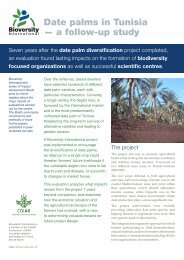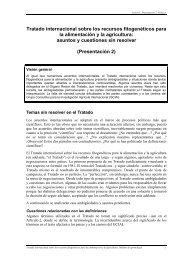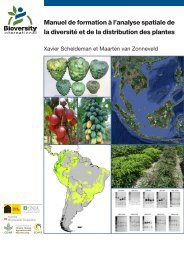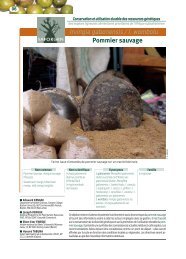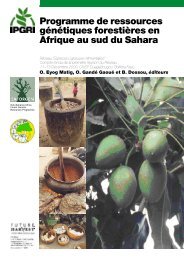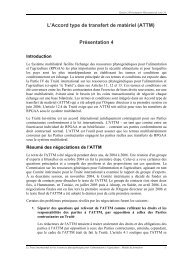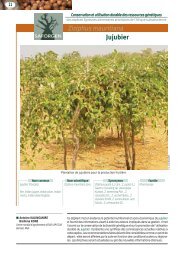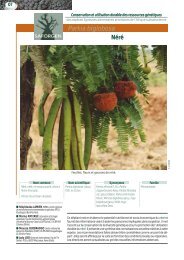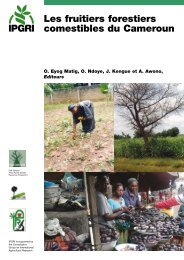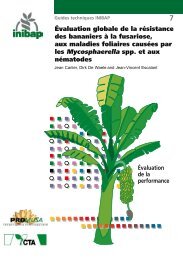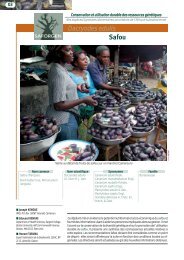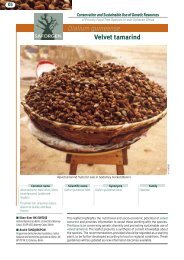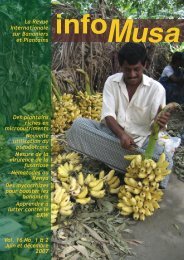- Page 1 and 2:
COOPERATION FRANÇ AISE CTA C R B P
- Page 3 and 4:
Sommaire Allocution d’ouverture d
- Page 5 and 6:
Sommaire / Contents Thierry Lescot
- Page 7 and 8:
Sommaire / Contents H. P. Singh, S.
- Page 9 and 10:
Allocution d’ouverture / Opening
- Page 11 and 12:
Allocution d’ouverture / Opening
- Page 13 and 14:
14 Les productions bananières / Ba
- Page 15:
Session 1 Importance de la banane s
- Page 18 and 19:
20 Les productions bananières / Ba
- Page 20 and 21:
22 Les productions bananières / Ba
- Page 22 and 23:
24 Les productions bananières / Ba
- Page 24 and 25:
26 Les productions bananières / Ba
- Page 26 and 27:
28 Les productions bananières / Ba
- Page 28 and 29:
30 Les productions bananières / Ba
- Page 30 and 31:
32 Les productions bananières / Ba
- Page 32 and 33:
34 Les productions bananières / Ba
- Page 35:
Amérique Latine - Caraïbes Latin
- Page 38 and 39:
40 Les productions bananières / Ba
- Page 40 and 41:
42 Les productions bananières / Ba
- Page 42 and 43:
44 Les productions bananières / Ba
- Page 44 and 45:
46 Les productions bananières / Ba
- Page 46 and 47:
48 Les productions bananières / Ba
- Page 48 and 49:
50 Les productions bananières / Ba
- Page 50 and 51:
52 Les productions bananières / Ba
- Page 52 and 53:
54 Les productions bananières / Ba
- Page 54 and 55:
56 Les productions bananières / Ba
- Page 56 and 57:
58 Les productions bananières / Ba
- Page 58 and 59:
60 Les productions bananières / Ba
- Page 60 and 61:
62 Les productions bananières / Ba
- Page 62 and 63:
64 Les productions bananières / Ba
- Page 64 and 65:
66 Les productions bananières / Ba
- Page 66 and 67:
68 Les productions bananières / Ba
- Page 68 and 69:
70 Les productions bananières / Ba
- Page 70 and 71:
72 Les productions bananières / Ba
- Page 72 and 73:
74 Les productions bananières / Ba
- Page 74 and 75:
76 Les productions bananières / Ba
- Page 76 and 77:
78 Les productions bananières / Ba
- Page 78 and 79:
80 Les productions bananières / Ba
- Page 80 and 81:
82 Les productions bananières / Ba
- Page 82 and 83:
84 Les productions bananières / Ba
- Page 85:
Afrique Africa
- Page 88 and 89:
90 Les productions bananières / Ba
- Page 90 and 91:
92 Les productions bananières / Ba
- Page 92 and 93:
94 Les productions bananières / Ba
- Page 94 and 95:
96 Les productions bananières / Ba
- Page 96 and 97:
98 Les productions bananières / Ba
- Page 98 and 99:
100 Les productions bananières / B
- Page 101 and 102:
Afrique / Africa : B.B. Kufimfut et
- Page 103 and 104:
Afrique / Africa : B.B. Kufimfut et
- Page 105 and 106:
Afrique / Africa : B.B. Kufimfut et
- Page 107 and 108:
Afrique / Africa : B.B. Kufimfut et
- Page 109 and 110:
Afrique / Africa : B.B. Kufimfut et
- Page 111 and 112:
Afrique / Africa : C. Madembo et al
- Page 113 and 114:
Afrique / Africa : C. Madembo et al
- Page 115:
Afrique / Africa : C. Madembo et al
- Page 118 and 119:
120 Les productions bananières / B
- Page 120 and 121:
122 Les productions bananières / B
- Page 122 and 123:
124 Les productions bananières / B
- Page 124 and 125:
126 Les productions bananières / B
- Page 126 and 127:
128 Les productions bananières / B
- Page 128 and 129:
130 Les productions bananières / B
- Page 130 and 131:
132 Les productions bananières / B
- Page 132 and 133:
134 Les productions bananières / B
- Page 134 and 135:
136 Les productions bananières / B
- Page 136 and 137:
138 Les productions bananières / B
- Page 138 and 139:
140 Les productions bananières / B
- Page 140 and 141:
142 Les productions bananières / B
- Page 142 and 143:
144 Les productions bananières / B
- Page 144 and 145:
146 Les productions bananières / B
- Page 146 and 147:
148 Les productions bananières / B
- Page 149 and 150:
Afrique / Africa : B. Banful Produc
- Page 151 and 152:
Afrique / Africa : B. Banful qualit
- Page 153 and 154:
Afrique / Africa : B. Banful The gr
- Page 155 and 156:
Afrique / Africa : B. Banful Below
- Page 157 and 158:
Afrique / Africa : B. Banful 30 cm
- Page 159 and 160:
Afrique / Africa : P.O. Ogazi Plant
- Page 161 and 162:
Afrique / Africa : C.S. Gold et al.
- Page 163 and 164:
Afrique / Africa : C.S. Gold et al.
- Page 165 and 166:
Afrique / Africa : C.S. Gold et al.
- Page 167 and 168:
Afrique / Africa : C.S. Gold et al.
- Page 169 and 170:
Afrique / Africa : C.S. Gold et al.
- Page 171 and 172:
Afrique / Africa : C.S. Gold et al.
- Page 173 and 174:
Afrique / Africa : C.S. Gold et al.
- Page 175 and 176:
Afrique / Africa : C.S. Gold et al.
- Page 177:
Afrique / Africa : C.S. Gold et al.
- Page 180 and 181:
182 Les productions bananières / B
- Page 182 and 183:
184 Les productions bananières / B
- Page 184 and 185:
186 Les productions bananières / B
- Page 186 and 187:
188 Les productions bananières / B
- Page 188 and 189:
190 Les productions bananières / B
- Page 190 and 191:
192 Les productions bananières / B
- Page 192 and 193:
194 Les productions bananières / B
- Page 194 and 195:
196 Les productions bananières / B
- Page 197 and 198:
Asie - Pacifique / Asia - Pacific :
- Page 199 and 200:
Asie - Pacifique / Asia - Pacific :
- Page 201 and 202:
Asie - Pacifique / Asia - Pacific :
- Page 203 and 204:
Asie - Pacifique / Asia - Pacific :
- Page 205:
Asie - Pacifique / Asia - Pacific :
- Page 208 and 209:
210 Les productions bananières / B
- Page 210 and 211:
212 Les productions bananières / B
- Page 212 and 213:
214 Les productions bananières / B
- Page 214 and 215:
216 Les productions bananières / B
- Page 216 and 217:
218 Les productions bananières / B
- Page 218 and 219:
220 Les productions bananières / B
- Page 220 and 221:
222 Les productions bananières / B
- Page 222 and 223:
224 Les productions bananières / B
- Page 225 and 226:
Asie - Pacifique / Asia - Pacific :
- Page 227 and 228:
Asie - Pacifique / Asia - Pacific :
- Page 229 and 230:
Asie - Pacifique / Asia - Pacific :
- Page 231 and 232:
Asie - Pacifique / Asia - Pacific :
- Page 233 and 234:
Asie - Pacifique / Asia - Pacific :
- Page 235 and 236:
Asie - Pacifique / Asia - Pacific :
- Page 237 and 238:
Asie - Pacifique / Asia - Pacific :
- Page 239 and 240:
Asie - Pacifique / Asia - Pacific :
- Page 241 and 242:
Asie - Pacifique / Asia - Pacific :
- Page 243 and 244:
Asie - Pacifique / Asia - Pacific :
- Page 245 and 246:
Asie - Pacifique / Asia - Pacific :
- Page 247 and 248:
Asie - Pacifique / Asia - Pacific :
- Page 249:
Session 2 Diversité et dynamique d
- Page 252 and 253:
254 Les productions bananières / B
- Page 254 and 255:
256 Les productions bananières / B
- Page 256 and 257:
258 Les productions bananières / B
- Page 258 and 259:
260 Les productions bananières / B
- Page 260 and 261:
262 Les productions bananières / B
- Page 263 and 264:
Amérique Latine - Caraïbes / Lati
- Page 265 and 266:
Amérique Latine - Caraïbes / Lati
- Page 267 and 268:
Amérique Latine - Caraïbes / Lati
- Page 269 and 270:
Amérique Latine - Caraïbes / Lati
- Page 271 and 272:
Amérique Latine - Caraïbes / Lati
- Page 273 and 274:
Amérique Latine - Caraïbes / Lati
- Page 275 and 276:
Amérique Latine - Caraïbes / Lati
- Page 277 and 278:
Amérique Latine - Caraïbes / Lati
- Page 279 and 280:
Amérique Latine - Caraïbes / Lati
- Page 281:
Amérique Latine - Caraïbes / Lati
- Page 284 and 285:
286 Les productions bananières / B
- Page 286 and 287:
288 Les productions bananières / B
- Page 288 and 289:
290 Les productions bananières / B
- Page 290 and 291:
292 Les productions bananières / B
- Page 292 and 293:
294 Les productions bananières / B
- Page 294 and 295:
296 Les productions bananières / B
- Page 296 and 297:
298 Les productions bananières / B
- Page 298 and 299:
300 Les productions bananières / B
- Page 300 and 301:
302 Les productions bananières / B
- Page 302 and 303:
304 Les productions bananières / B
- Page 304 and 305:
306 Les productions bananières / B
- Page 306 and 307:
308 Les productions bananières / B
- Page 309 and 310:
Amérique Latine - Caraïbes / Lati
- Page 311 and 312:
Amérique Latine - Caraïbes / Lati
- Page 313 and 314:
Amérique Latine - Caraïbes / Lati
- Page 315 and 316:
Amérique Latine - Caraïbes / Lati
- Page 317 and 318:
Amérique Latine - Caraïbes / Lati
- Page 319 and 320:
Amérique Latine - Caraïbes / Lati
- Page 321 and 322:
Amérique Latine - Caraïbes / Lati
- Page 323:
Amérique Latine - Caraïbes / Lati
- Page 326 and 327:
328 Les productions bananières / B
- Page 328 and 329:
330 Les productions bananières / B
- Page 330 and 331:
332 Les productions bananières / B
- Page 332 and 333:
334 Les productions bananières / B
- Page 334 and 335:
336 Les productions bananières / B
- Page 336 and 337:
338 Les productions bananières / B
- Page 338 and 339:
340 Les productions bananières / B
- Page 340 and 341:
342 Les productions bananières / B
- Page 342 and 343:
344 Les productions bananières / B
- Page 344 and 345:
346 Les productions bananières / B
- Page 346 and 347:
348 Les productions bananières / B
- Page 349:
Afrique Africa
- Page 352 and 353:
354 Les productions bananières / B
- Page 354 and 355:
356 Les productions bananières / B
- Page 356 and 357:
358 Les productions bananières / B
- Page 359 and 360:
Afrique - Africa : J. Tchango Tchan
- Page 361 and 362:
Afrique - Africa : J. Tchango Tchan
- Page 363 and 364:
Afrique - Africa : J. Tchango Tchan
- Page 365 and 366:
Afrique - Africa : J. Tchango Tchan
- Page 367 and 368:
Afrique - Africa : J. Tchango Tchan
- Page 369 and 370:
Afrique - Africa : J. Tchango Tchan
- Page 371:
Afrique - Africa : J. Tchango Tchan
- Page 374 and 375:
376 Les productions bananières / B
- Page 376 and 377:
378 Les productions bananières / B
- Page 378 and 379:
380 Les productions bananières / B
- Page 380 and 381:
382 Les productions bananières / B
- Page 382 and 383:
384 Les productions bananières / B
- Page 384 and 385:
386 Les productions bananières / B
- Page 386 and 387:
388 Les productions bananières / B
- Page 388 and 389:
390 Les productions bananières / B
- Page 390 and 391:
392 Les productions bananières / B
- Page 392 and 393:
394 Les productions bananières / B
- Page 394 and 395:
396 Les productions bananières / B
- Page 396 and 397:
398 Les productions bananières / B
- Page 398 and 399:
400 Les productions bananières / B
- Page 400 and 401:
402 Les productions bananières / B
- Page 402 and 403:
404 Les productions bananières / B
- Page 404 and 405:
406 Les productions bananières / B
- Page 406 and 407:
408 Les productions bananières / B
- Page 408 and 409:
410 Les productions bananières / B
- Page 410 and 411:
412 Les productions bananières / B
- Page 412 and 413:
414 Les productions bananières / B
- Page 414 and 415:
416 Les productions bananières / B
- Page 416 and 417:
418 Les productions bananières / B
- Page 419:
Asie - Pacifique Asia - Pacific
- Page 422 and 423:
424 Les productions bananières / B
- Page 424 and 425:
426 Les productions bananières / B
- Page 426 and 427:
428 Les productions bananières / B
- Page 428 and 429:
430 Les productions bananières / B
- Page 430 and 431:
432 Les productions bananières / B
- Page 432 and 433:
434 Les productions bananières / B
- Page 434 and 435:
436 Les productions bananières / B
- Page 436 and 437:
438 Les productions bananières / B
- Page 438 and 439:
440 Les productions bananières / B
- Page 440 and 441:
442 Les productions bananières / B
- Page 443 and 444:
Asie/Pacifique - Asia/Pacific : J.M
- Page 445 and 446:
Asie/Pacifique - Asia/Pacific : J.M
- Page 447 and 448:
Asie/Pacifique - Asia/Pacific : J.M
- Page 449 and 450:
Asie/Pacifique - Asia/Pacific : J.M
- Page 451 and 452:
Asie/Pacifique - Asia/Pacific : J.M
- Page 453 and 454:
Asie/Pacifique - Asia/Pacific : J.M
- Page 455 and 456:
Asie/Pacifique - Asia/Pacific : J.M
- Page 457 and 458:
Asie/Pacifique - Asia/Pacific : J.M
- Page 459 and 460:
Asie/Pacifique - Asia/Pacific : J.M
- Page 461:
Asie/Pacifique - Asia/Pacific : J.M
- Page 464 and 465:
466 Les productions bananières / B
- Page 466 and 467:
468 Les productions bananières / B
- Page 468 and 469:
470 Les productions bananières / B
- Page 470 and 471:
472 Les productions bananières / B
- Page 473 and 474:
Synthèse des discussions 475 La re
- Page 475 and 476:
Introduction : J. Chataigner Introd
- Page 477 and 478:
Introduction : J. Chataigner nomie,
- Page 479 and 480:
Introduction : J. Chataigner la sé
- Page 481 and 482:
Introduction : J. Chataigner Un aut
- Page 483:
Afrique Africa
- Page 486 and 487:
488 Les productions bananières / B
- Page 488 and 489:
490 Les productions bananières / B
- Page 490 and 491:
492 Les productions bananières / B
- Page 492 and 493:
494 Les productions bananières / B
- Page 494 and 495:
496 Les productions bananières / B
- Page 496 and 497:
498 Les productions bananières / B
- Page 498 and 499:
500 Les productions bananières / B
- Page 500 and 501:
502 Les productions bananières / B
- Page 502 and 503:
504 Les productions bananières / B
- Page 504 and 505:
506 Les productions bananières / B
- Page 506 and 507:
508 Les productions bananières / B
- Page 508 and 509:
510 Les productions bananières / B
- Page 510 and 511:
512 Les productions bananières / B
- Page 512 and 513:
514 Les productions bananières / B
- Page 514 and 515:
516 Les productions bananières / B
- Page 516 and 517:
518 Les productions bananières / B
- Page 518 and 519:
520 Les productions bananières / B
- Page 520 and 521:
522 Les productions bananières / B
- Page 523 and 524:
Afrique / Africa : L. Temple et J.
- Page 525 and 526:
Afrique / Africa : L. Temple et J.
- Page 527 and 528:
Afrique / Africa : L. Temple et J.
- Page 529 and 530:
Afrique / Africa : L. Temple et J.
- Page 531 and 532:
Afrique / Africa : L. Temple et J.
- Page 533 and 534:
Afrique / Africa : L. Temple et J.
- Page 535 and 536:
Afrique / Africa : A. N’Da Adopo
- Page 537 and 538:
Afrique / Africa : A. N’Da Adopo
- Page 539 and 540:
Afrique / Africa : A. N’Da Adopo
- Page 541 and 542:
Afrique / Africa : A. N’Da Adopo
- Page 543 and 544:
Afrique / Africa : A. N’Da Adopo
- Page 545 and 546:
Afrique / Africa : A. N’Da Adopo
- Page 547 and 548:
Afrique / Africa : A. N’Da Adopo
- Page 549 and 550:
Afrique / Africa : A. N’Da Adopo
- Page 551:
Afrique / Africa : A. N’Da Adopo
- Page 554 and 555:
556 Les productions bananières / B
- Page 556 and 557:
558 Les productions bananières / B
- Page 558 and 559:
560 Les productions bananières / B
- Page 560 and 561:
562 Les productions bananières / B
- Page 562 and 563:
564 Les productions bananières / B
- Page 565 and 566:
Europe : D. Lœillet Le marché int
- Page 567 and 568:
Europe : D. Lœillet Tableau 1. Les
- Page 569 and 570:
Europe : D. Lœillet Gros Michel An
- Page 571 and 572:
Europe : D. Lœillet Fair Trade ou
- Page 573 and 574:
Europe : D. Lœillet mentaire qui r
- Page 575 and 576:
Europe : H. Tabuna Le marché de la
- Page 577 and 578: Europe : H. Tabuna 579 les ressorti
- Page 579 and 580: Europe : H. Tabuna 581 Il concerne
- Page 581 and 582: Europe : H. Tabuna 583 marché de C
- Page 583 and 584: Europe : H. Tabuna 585 dans la dist
- Page 585 and 586: Europe : H. Tabuna 587 consommateur
- Page 587: Europe : H. Tabuna 589 Parigi J. 19
- Page 591 and 592: Amérique Latine - Caraïbes / Lati
- Page 593 and 594: Amérique Latine - Caraïbes / Lati
- Page 595: Amérique Latine - Caraïbes / Lati
- Page 599 and 600: Asie - Pacifique / Asia - Pacific :
- Page 601 and 602: Asie - Pacifique / Asia - Pacific :
- Page 603 and 604: Asie - Pacifique / Asia - Pacific :
- Page 605 and 606: Asie - Pacifique / Asia - Pacific :
- Page 607 and 608: Asie - Pacifique / Asia - Pacific :
- Page 609 and 610: Asie - Pacifique / Asia - Pacific :
- Page 611 and 612: Asie - Pacifique / Asia - Pacific :
- Page 613 and 614: Asie - Pacifique / Asia - Pacific :
- Page 615 and 616: Asie - Pacifique / Asia - Pacific :
- Page 617: Asie - Pacifique / Asia - Pacific :
- Page 620 and 621: 622 Les productions bananières / B
- Page 622 and 623: 624 Les productions bananières / B
- Page 624 and 625: 626 Les productions bananières / B
- Page 626 and 627: 628 Les productions bananières / B
- Page 631: Session 4 Systèmes de productions
- Page 634 and 635: 636 Les productions bananières / B
- Page 636 and 637: 638 Les productions bananières / B
- Page 638 and 639: 640 Les productions bananières / B
- Page 640 and 641: 642 Les productions bananières / B
- Page 642 and 643: 644 Les productions bananières / B
- Page 645: Afrique Africa
- Page 648 and 649: 650 Les productions bananières / B
- Page 650 and 651: 652 Les productions bananières / B
- Page 652 and 653: 654 Les productions bananières / B
- Page 654 and 655: 656 Les productions bananières / B
- Page 656 and 657: 658 Les productions bananières / B
- Page 658 and 659: 660 Les productions bananières / B
- Page 660 and 661: 662 Les productions bananières / B
- Page 662 and 663: 664 Les productions bananières / B
- Page 664 and 665: 666 Les productions bananières / B
- Page 666 and 667: 668 Les productions bananières / B
- Page 668 and 669: 670 Les productions bananières / B
- Page 670 and 671: 672 Les productions bananières / B
- Page 672 and 673: 674 Les productions bananières / B
- Page 674 and 675: 676 Les productions bananières / B
- Page 676 and 677: 678 Les productions bananières / B
- Page 678 and 679:
680 Les productions bananières / B
- Page 681 and 682:
Afrique / Africa : C. Makambila La
- Page 683:
Afrique / Africa : C. Makambila Con
- Page 686 and 687:
688 Les productions bananières / B
- Page 688 and 689:
690 Les productions bananières / B
- Page 690 and 691:
692 Les productions bananières / B
- Page 692 and 693:
694 Les productions bananières / B
- Page 695 and 696:
Afrique / Africa : K.R. Green et al
- Page 697 and 698:
Afrique / Africa : K.R. Green et al
- Page 699 and 700:
Afrique / Africa : K.R. Green et al
- Page 701 and 702:
Afrique / Africa : K.R. Green et al
- Page 703:
Afrique / Africa : K.R. Green et al
- Page 706 and 707:
708 Les productions bananières / B
- Page 708 and 709:
710 Les productions bananières / B
- Page 710 and 711:
712 Les productions bananières / B
- Page 712 and 713:
714 Les productions bananières / B
- Page 714 and 715:
716 Les productions bananières / B
- Page 717 and 718:
Afrique / Africa : A.R. Ajayi and K
- Page 719 and 720:
Afrique / Africa : A.R. Ajayi and K
- Page 721 and 722:
Afrique / Africa : A.R. Ajayi and K
- Page 723 and 724:
Afrique / Africa : A.R. Ajayi and K
- Page 725:
Afrique / Africa : A.R. Ajayi and K
- Page 728 and 729:
730 Les productions bananières / B
- Page 730 and 731:
732 Les productions bananières / B
- Page 732 and 733:
734 Les productions bananières / B
- Page 734 and 735:
736 Les productions bananières / B
- Page 736 and 737:
738 Les productions bananières / B
- Page 738 and 739:
740 Les productions bananières / B
- Page 740 and 741:
742 Les productions bananières / B
- Page 742 and 743:
744 Les productions bananières / B
- Page 744 and 745:
746 Les productions bananières / B
- Page 746 and 747:
748 Les productions bananières / B
- Page 748 and 749:
750 Les productions bananières / B
- Page 751:
Amérique Latine - Caraïbes Latin
- Page 754 and 755:
756 Les productions bananières / B
- Page 756 and 757:
758 Les productions bananières / B
- Page 758 and 759:
760 Les productions bananières / B
- Page 760 and 761:
762 Les productions bananières / B
- Page 762 and 763:
764 Les productions bananières / B
- Page 764 and 765:
766 Les productions bananières / B
- Page 766 and 767:
768 Les productions bananières / B
- Page 769 and 770:
Asie - Pacifique / Asia - Pacific :
- Page 771 and 772:
Asie - Pacifique / Asia - Pacific :
- Page 773 and 774:
Asie - Pacifique / Asia - Pacific :
- Page 775 and 776:
Asie - Pacifique / Asia - Pacific :
- Page 777:
Asie - Pacifique / Asia - Pacific :
- Page 781 and 782:
Liste des participants / List of pa
- Page 783 and 784:
Liste des participants / List of pa
- Page 785 and 786:
Liste des participants / List of pa
- Page 787 and 788:
Liste des participants / List of pa
- Page 789 and 790:
Liste des participants / List of pa
- Page 791:
Liste des participants / List of pa
- Page 794 and 795:
796 Les productions bananières / B
- Page 797 and 798:
Dépôt légal : 59 - février 2000



